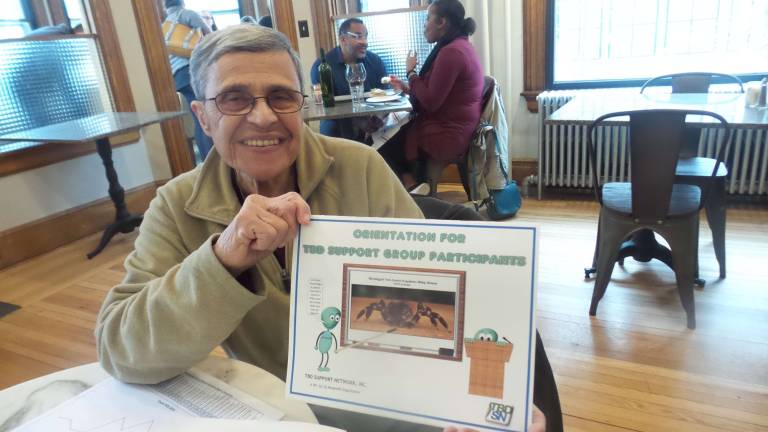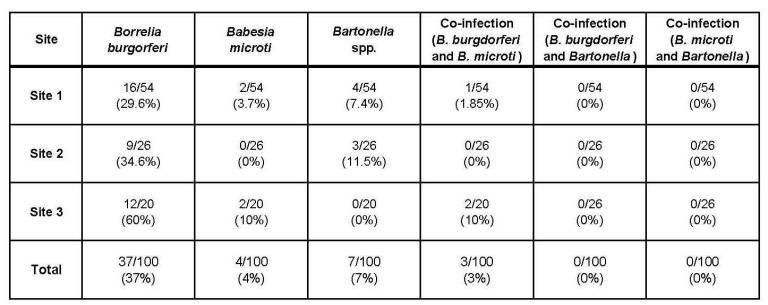Lyme is 'not the only game in town'



By Frances Ruth Harris
MILFORD — Lyme disease is still a big deal, says advocate Mikki Weiss. But it's no longer the only game in town.
She says what you don't know about tick borne diseases and the pathogens they harbor can kill you. Very often, an entire family gets infected. Weiss, who was herself afflicted, said this can translate to loss of income and even one's value as a person. People with cancer or HIV who contract a tick-borne disease may find their illness accelerating, she said.
She showed a photo of herself in the hospital.
"This occurred on Aug. 10, 2016," she said. "I passed out at 2 a.m. when I hit my face on the edge of a wicker couch. This represents what can happen when one lives with tick-borne diseases. I've lived with three tick-borne diseases since 2011. My eye socket and several fingers were broken. I incurred $100,000 of diagnostic testing resulting with no findings, which commonly can happen with tick borne diseases."
Weiss is CEO, president and founder of the Tick Borne Diseases (TBD) Support Network. She's helping tristate residents understand the complexity of tick borne diseases and how they affect people's lives. Faye P. Lukin, the communications consultant volunteer to the TBD Support Network, had Weiss as a teacher in the seventh grade 52 years ago. The complexity stems from the fact that there are many species of ticks that carry many diseases. According to the PennState College of Agricultural Sciences, Pennsylvania alone has four different disease-carrying ticks that are vectors for six diseases that have occurred in the state (see sidebar).
Weiss said Bartonella, also known as cat scratch fever, can be just as devastating as Lyme, and also can be transmitted to an unborn child. In the first-ever study of black-legged ticks and infection rates in Milford borough, completed in February, seven tested positive for Bartonella. Thirty-seven black-legged ticks tested positive for Borrelia burgdorferi, which can affect the heart, bones, and nervous system if left untreated; and four for Babesia microti (Babesiosis), a relatively mild tick-borne illness that can cause flu-like symptoms. Three ticks in the borough tested positive for both.
Overall, 45 percent of ticks collected in the borough, at sites frequented by people and pets, tested positive for at least one pathogen, according to the report. It characterized the rate of tick-borne disease in the borough as a "high prevalence," and said future studies will be done to determine the presence of yet more tick-borne diseases, including anaplasmosis, Borrelia miyamotoi, and Powassan virus.
Prevention is keyWeiss said tick borne-diseases can manifest their presence in the human body after lying dormant for years. Prevention is the key, she said, with proper follow-up after outdoors experiences (see sidebar).
The TBD Support Network received a grant from the Greater Pike Foundation to create resource material for patients in support group. It lists a number of issues that must be considered in fighting these diseases:
Impact on family
Health insurance
Pharmaceuticals
Medical treatment controversy
Medical education
Diagnosis and pathogen load
Symptoms
Immune system and nutrition
Patient responsibility
Co-infection
Governmental-political
Medical professional and research scientists
Funding for medical research
Upcoming meetingsThe TBD support group will meet from 10:30 a.m. to noon on Saturday, May 12, in the community room of the Pike County Library to share stories about living with TBD.
The community is invited to attend a meeting from 7 to 8:30 p.m. on Thursday, May 17, to listen to a presentation of the survey conducted by the Northeast Wildlife DNA Lab. The Tick Borne Diseases (TBD) support group's hotline, 570-503-6334, offers guidance and information.